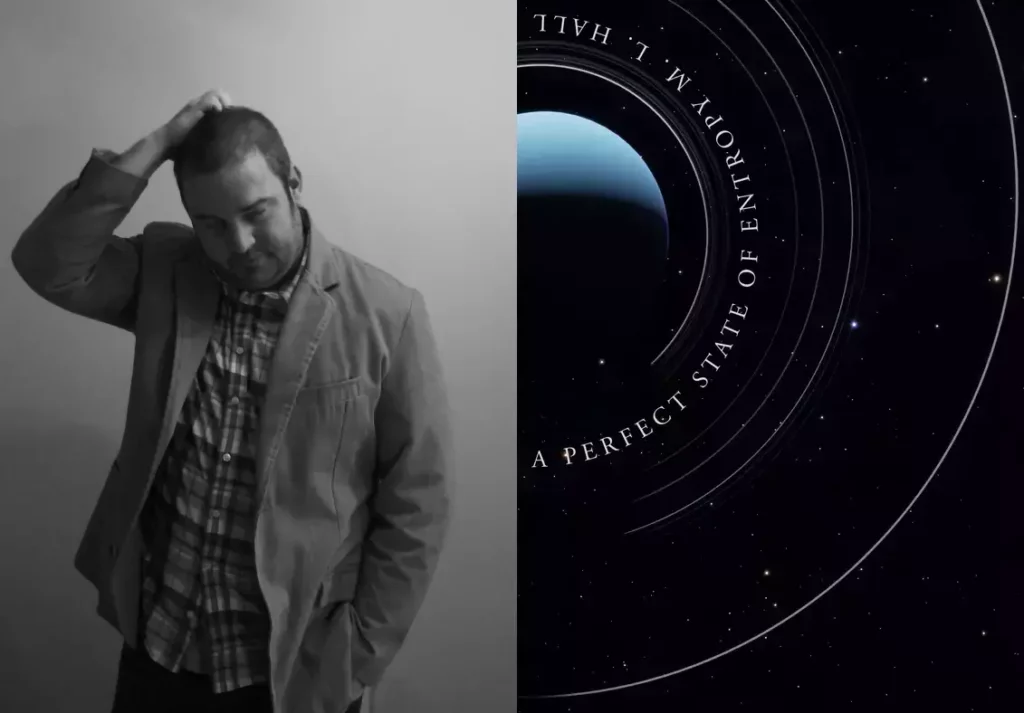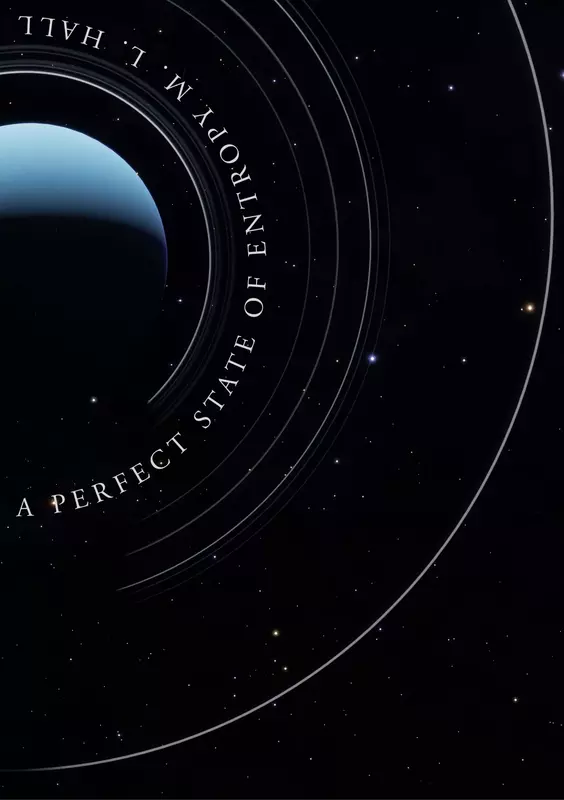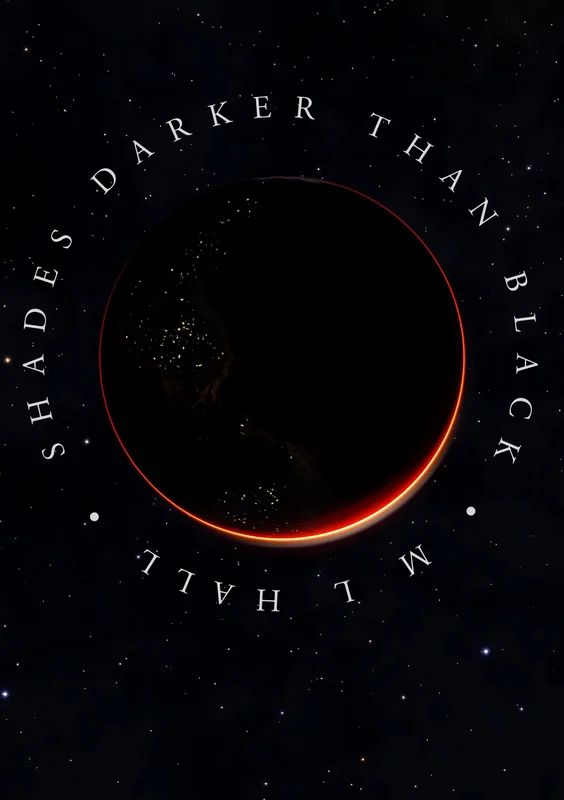This post may contain affiliate links. Read more here.

Hey everyone! I’m thrilled to introduce you to M. L. Hall, the creative genius behind “A Perfect State of Entropy.“
Around ten or fifteen years ago, Hall took the plunge into writing and hasn’t looked back since. Inspired by Greek myths and armed with a passion for painting, he’s crafted a universe where Skip’s intergalactic journey unfolds.
From crafting characters to building whole new worlds, I hope you’ll find our conversation about Matt’s novel as fascinating as I did.
A Perfect State of Entropy by M. L. Hall
Can you share a bit about yourself and how you got started on your writing journey? What led you to become an author?
I am an artist, so I tend to bounce from project to project. I began taking it seriously ten or fifteen years ago when I joined several writing groups. As a result, I grew a lot and started refining my craft. As for why, I just felt drawn to it the way I am to painting and stained glass work.
Can you tell us about the inspiration behind ‘A Perfect State of Entropy’? What motivated you to write this particular story, and how did the idea for Skip’s intergalactic journey come to you?
The Odyssey was the biggest inspiration.
I love the Greek myths and characters and thought a Odyssey-like story in space would be fun and interesting. I played around with the idea for years but let it marinate before sitting down to write it.
APSOE is one half of the story, an optimistic and hopeful tale, paired with the much darker prequel, ‘Shades Darker than Black.‘ The stories should complement and contrast with each other.
The universe you’ve created in your book seems vast and intriguing. How did you approach world-building and creating the alien worlds that Skip encounters during his journey?
My intention was to construct a world that mirrors our own, inhabited by humans facing real consequences for their actions. Ensuring logical coherence was vital to me. I have difficulty suspending my disbelief, and I am always aware of it.
I made sure to avoid easy techno-babble solutions or characters with miraculous abilities. Instead, my characters, while intelligent and insightful, have no idea what they’re doing. Finding a way to suspend my own disbelief helped me create it.
Everything else flows from those concepts.
Skip’s character embarks on a perilous adventure, facing various challenges along the way. How did you develop his character, and what were the key traits you wanted him to possess as the protagonist?
Scipio and the others are humans, and one of the defining traits of our species is relentlessness. The plot, the prose, and Skip should have a ceaseless forward momentum until the end.
Skip, and the others, suffered traumatic events, and despite this, they plod on, finding a way around everything in their path and finding ways to heal in a chaotic universe that throws everything at them.
“A Perfect State of Entropy” deals with mind-bending physics and ancient mysteries. How did you research and incorporate these elements into your story to create a sense of wonder and fascination?
I love anything related to space and science, and it was a blast coming up with plausible planetary environments. I aimed to portray things as they should look in the real world, incorporating elements of chemistry, biology, and astronomy.
Making Skip’s universe feel authentic was important to me.
The science and research, however, serve as background elements rather than plot points. They simply contribute to the shared universe. Nevertheless, I do have plans to explore The Builders in the future.
Science fiction often explores complex themes and ideas. Were there any specific themes or messages you wanted to convey to your readers through your book?
There aren’t explicit themes or messages for the most part; it is primarily a story. However, there are certain things I did want to convey. In APSOE, one of the main themes revolves around the idea that humanity could bring about our own destruction.
As it is stated, ‘The Builders whisper to us from their inexplicably vacant places: if beings that rise as high as us can die in silence and darkness, then why not humanity?‘ We are approaching critical points that could lead to such an outcome.
APSOE tells the story of a world after its end—a breakdown of social safety nets, food supply, infrastructure, and people. The follow-up book delves into the actions and their consequences.
As an author, how do you approach the creative process? Do you have any particular routines or rituals that help you get into the writing flow?
Do you have any particular routines or rituals that help you get into the writing flow? Not really. I don’t tend to plan anything out. I sit down and write, and then through the editing process, I begin cleaning things up, thinking about logical consistency and prose.
What were the most significant challenges you faced while writing “A Perfect State of Entropy”? How did you overcome them?
I had none. I sat down, I wrote it. That was it. It just sort of was there. The same has happened with the follow up book. It was basically written before I realized it.
Can you share your thoughts on the importance of science fiction as a genre and how it allows writers to explore possibilities beyond our current reality?
Science fiction gives us a space to explore the universe and ourselves. It is a blank slate we can use to discover all sorts of things about ourselves. It gives us hope for the future and can serve as a warning.
Are there any specific authors or books that have influenced your writing style or inspired your work in the science fiction genre?
I tend to prefer literary fiction as opposed to science fiction. Believe it or not, I am not a fan of most science fiction, with exceptions like Star Trek.
In fiction, I enjoy Cormac McCarthy, Chuck Palahniuk, F. Scott Fitzgerald, Hemingway, and Margaret Atwood.
Lately, I have been on a non-fiction kick. I am going back through Stephen Fry’s trilogy: ‘Mythos,’ ‘Heroes,’ and ‘Troy.’
I am finishing up ‘SPQR‘ and have recently completed ‘The Cosmic Serpent,’ ‘Blood and Thunder,’ and ‘Empire of the Summer Moon.’
What do you hope readers will take away from “A Perfect State of Entropy“? Is there a particular emotion or experience you wish to evoke in your audience?
I hope they enjoy the journey and the world I tried to create. It is beautiful and terrible and yet, there is still hope.
How can our readers connect with you, and are there any projects you’re currently working on?
I am working on the prequel currently. It is called, “Shades Darker than Black.” It’s largely written. I will begin editing soon. As far as the universe itself, I would love to get other authors to write in universe.
There are too many stories to tell and I am not the one to tell them. I would like to crowdsource the universe.
If you would like more info or an update when the prequel is finished, please reached out to mlhallbooksupdates@protonmail.com. I have a paranormal-horror/mystery book outside this universe coming up as well, so stay tuned! My book can be found at the following link.
I hope you enjoyed this interview with Matt! Happy reading! 📖

